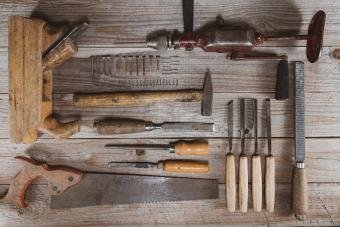
The key to keeping your vinyl collection in playable condition is knowing how to store vinyl records the right way. There are environmental concerns you must take into account when storing your records, as well as structural considerations that keep vinyl from warping or cracking. These tips can help.
Control the Environment Where You Store Vinyl Records
Where you store your vinyl records matters just as much as how you store them. Never store your vinyl collection in a damp basement or an attic or garage that has temperature fluctuations. Living rooms, dens, or music-themed bedrooms are a better choice. Vinyl is delicate, and environmental hazards can cause it to degrade.
Ideal Storage Temperature for Vinyl Records
Room temperature (about 70 degrees Fahrenheit) is best. Avoid extreme heat when storing vinyl. In addition, temperature fluctuations can be especially damaging. Choose a place where the temperature does not change more than 15 degrees in a 24-hour period.
Store Vinyl in the Dark
Over time, exposure to bright light can damage vinyl. Even if you're keeping your records in their sleeves, put them in a shady spot in your living room where they don't get direct exposure to sunlight.
Keep Vinyl Records Dry
Moisture can damage vinyl records. Keep them in a room with relatively low humidity. Never store your vinyl collection in a bathroom or basement. Also avoid plastic tubs, which may discourage proper air circulation.
Avoid Nearby Vibrations
Environmental vibrations can damage vinyl records. When you choose a storage space, think about what's nearby that might cause the records to vibrate. Some things to avoid include speakers, loud street traffic near a window, the washing machine, or the wall adjacent to your garage.
Always Store Vinyl Records Upright
You should always store vinyl records upright, rather than stacked horizontally. Stacking the records places pressure on the bottom of the stack and can cause irreparable damage. Even when storing records on a shelf, try to keep the records from slanting too much in either direction.
Store Like Sizes Together
Storing multiple sizes of records together can damage the larger records. Always sort and store your record collection by size. On a shelf, use a divider to separate records with varying diameter.
Use Static-Free Plastic Protectors for Records
Static is another enemy of vinyl, and the key to avoiding it is using static-free record protectors. This is especially true for rare vinyl records. Protective sleeves made of polyethylene are a good choice, such as Vinyl Styl Archival Quality Inner Record Sleeves.
How to Store Vinyl Records Without Sleeves
If your record does not have its original cardboard sleeve, simply store it in a polyethylene vinyl sleeve. Be sure to label it with the details of the album.
How to Store Vinyl Records With Sleeves
If you do have the original sleeve, you should still use a polyethylene sleeve inside the cardboard sleeve. Then use a second polyethylene sleeve over the cardboard.
Choose the Right Record Storage Shelves
The shelves you choose to store vinyl records are also important. There are plenty of creative choices, but they should meet a few minimum requirements.

Strong Enough to Support Your Vinyl Collection
According to Discogs, a vinyl record collection stored upright weighs 35 pounds per linear foot. This means you need shelves that can support this kind of weight. For example, if each shelf is three feet long, each shelf should support a minimum of 105 pounds.
Large Enough to Provide Support for the Whole Record
Similarly, the width of the actual shelf needs to be large enough to support the entire record. A typical LP is just over 12 inches on each side. That means shelves must be deeper than 12 inches to provide adequate support.
Materials That Discourage Static
Make sure shelves and storage materials are not made of metal. Because it conducts well, metal makes a poor choice for vinyl storage. It can transfer a static shock to the records. Instead, opt for wood or other less conductive materials.
Creative Vinyl Record Storage Ideas
Shelves are the classic choice for storing a vinyl record collection, but there are other fun options. Try some of these creative and cool vinyl record storage ideas.
Magazine Files
Magazine files offer a great option for seeing your vinyl collection and providing proper air flow while still keeping records upright for storage. You can find them in a variety of materials and colors. Customize the files by decoupaging them with pictures of your favorite bands. Choose ones that are at least 13 inches square for LPs.

Slide-Out Bins and Baskets
You can use bins and basket that slide in and out of shelves to give you better organization of your record collection. Choose materials that offer good support and don't encourage static. Customize by adding dividers to sort your collection.

Wooden Crates
This is a classic and affordable choice for anyone who wants to store a small vinyl record collection. Make sure the crate has adequate support for your records and is at least 13 inches wide. You can get creative by painting or staining the crate to match your decor, or you can use an antique or vintage crate with a fun advertisement.

Storage Trunks
Storage trunks offer a great option for keeping vinyl safe. Make sure the truck has enough air circulation to keep humidity from building up. If you choose to use an antique steamer trunk or a fun piece of vintage luggage, make sure there's no mold and no potentially damaging materials in the construction of the trunk.

Vintage Furniture
A classic and fun choice for storing vinyl records is vintage furniture. You can use a piece designed for record storage or something made for another purpose. Sideboards and buffets can be perfect, and old dressers with very deep drawers can work too. Simply make sure the vintage piece you choose fits all the requirements for good storage furniture listed above.

Settle on a Storage System That Works
No matter what kind of vinyl storage solution you choose, settle on a system that works for you. If you're designing a music room or other space, keep proper vinyl storage in mind as you choose furniture. That way, proper storage will be a basic part of your design, and you won't have to think about how to store vinyl records every time you add to your collection.







